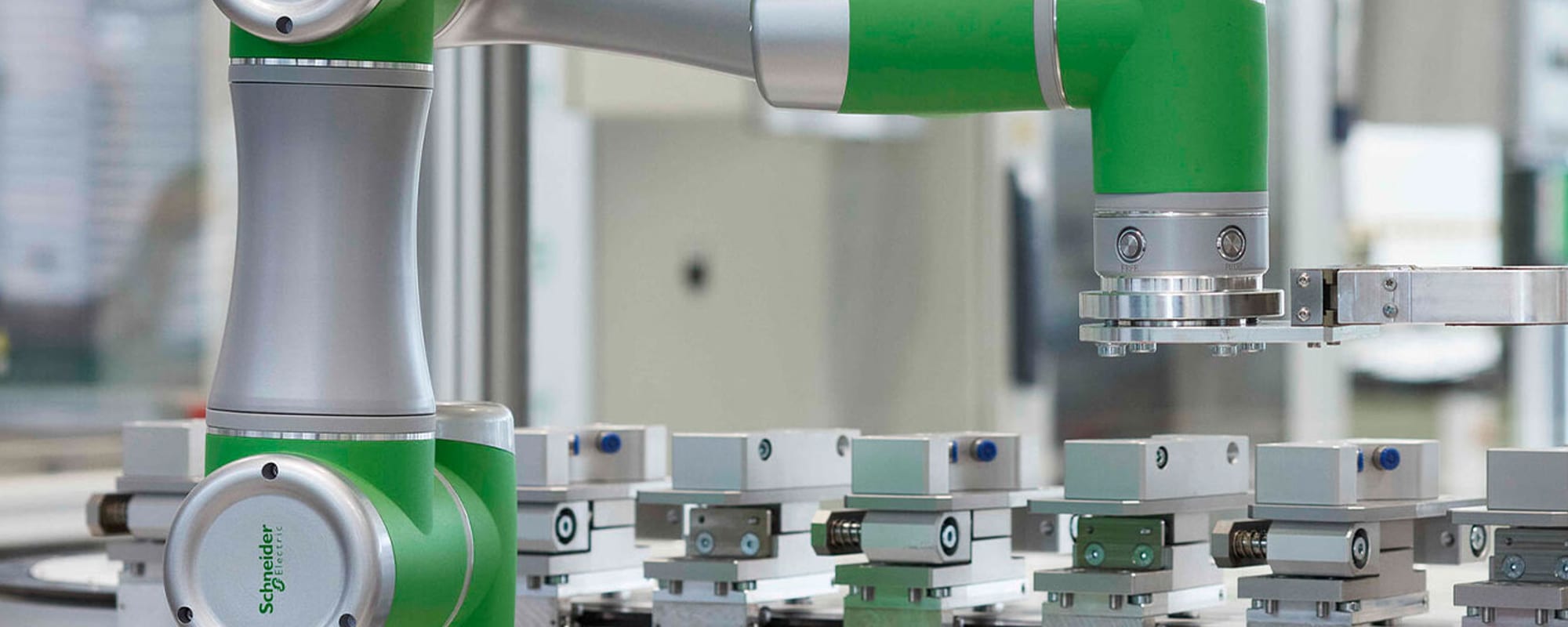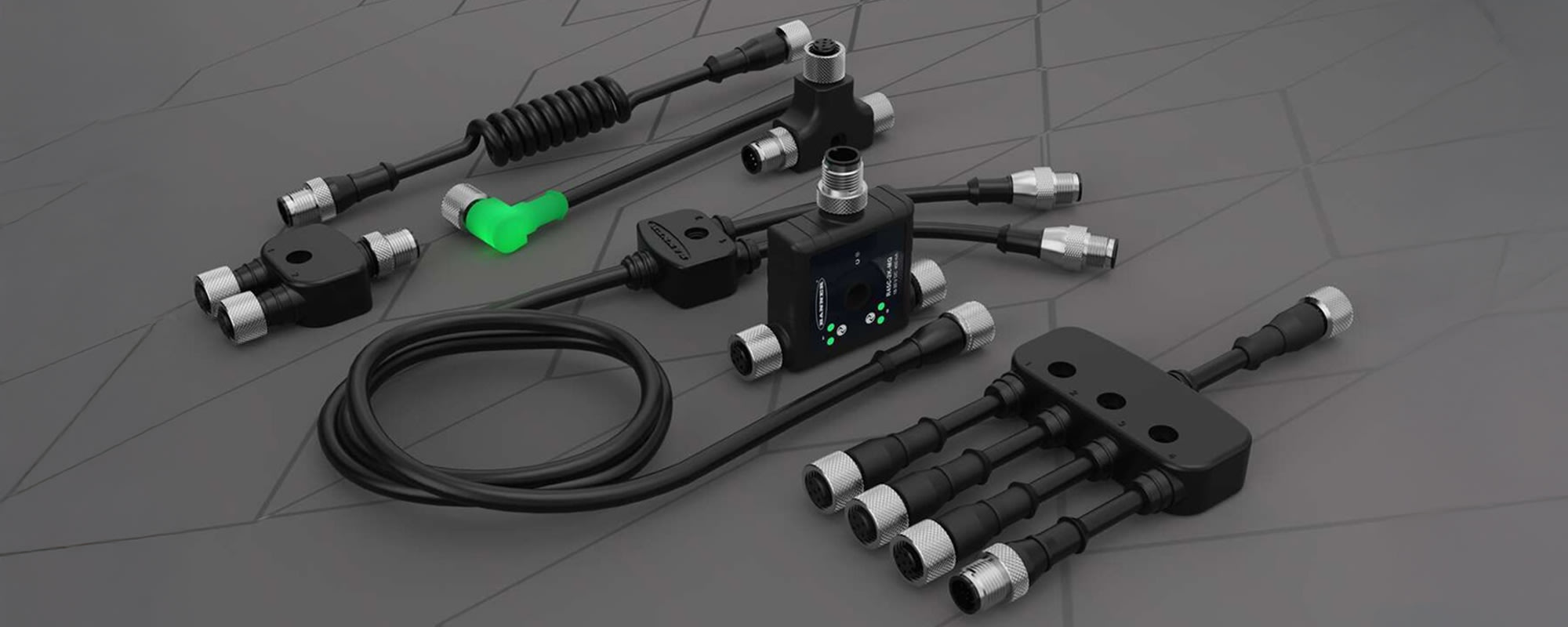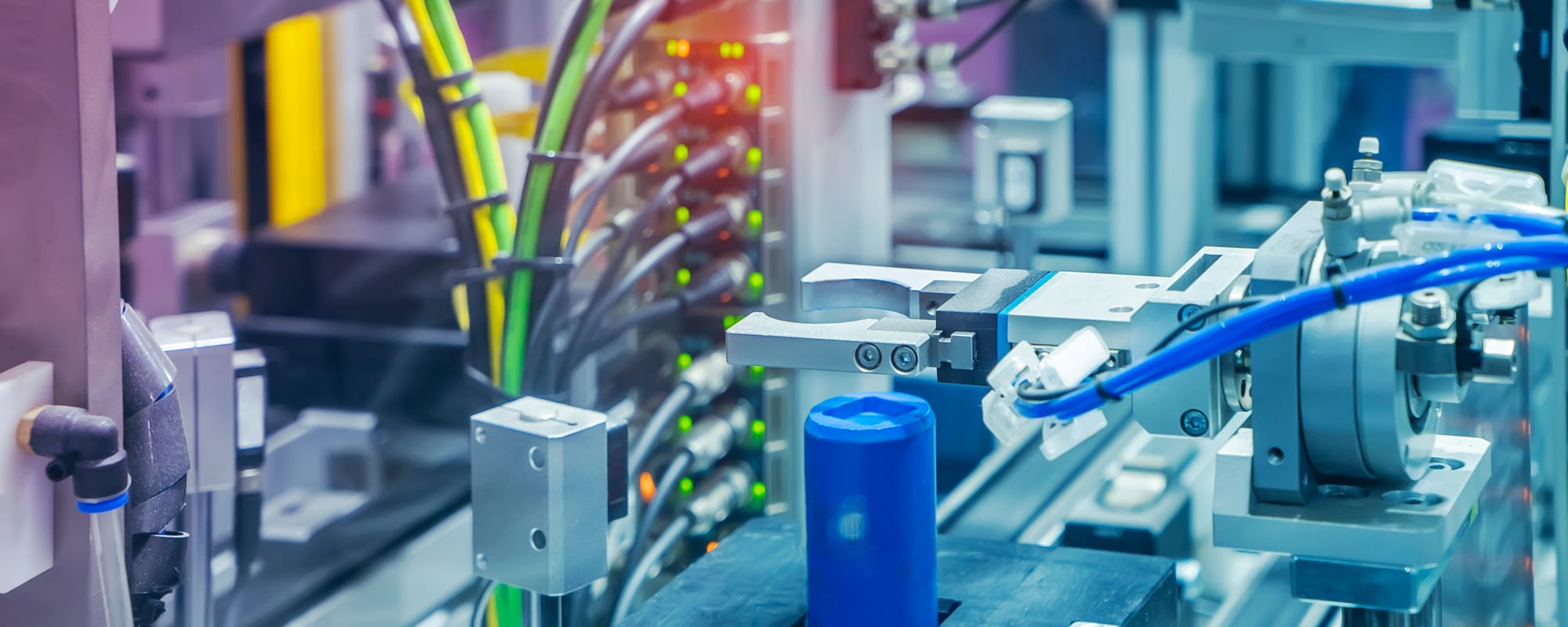Gary Zeppetella, Senior Offer Manager – Motion and Robotics at Schneider Electric, deep dives into smart manufacturing, addressing trends driving the adoption of industrial robots, the benefits of robots and cobots in various industries and applications, and how implementing the right end-to-end integrated cobot solutions for your facility can help you achieve high-throughput production with increased efficiency and sustainability.

The ever-growing demand for increased productivity and efficiency within manufacturing processes continues to drive the need for smart technologies in factory environments. Smart technologies enable intelligent machines, such as collaborative robots, to help meet increased product demands, improve product quality, and reduce time to market. Intelligent collaborative robots, or cobots, support consistent operations and eliminate the inherent inefficiencies of manufacturing processes. Smart manufacturing is an umbrella term for Industry 4.0 processes and operations that utilize automation and digitization to create additional value, and is fueled by interconnected, data-driven networks of industrial machines, including a steadily increasing number of robots. Industrial machines like robots and cobots can leverage the constant, real-time data-sharing capabilities of all the connected devices in their network to automate and optimize tasks.
The use of robotics in industrial automation is not a new trend, as there were 3.5 million industrial robots in factories around the world as of 2022, per the IFR world robotics report. This increased acceptance of robotics, combined with the significant advances in machine learning and machine vision catalyzed by Industry 4.0, have led to broader availability, easier implementation, and a lower total cost of ownership (TCO). According to ARK Investment Management, a cost model for industrial robots over the last 20 years shows prices decreasing from around $130,000 in 1995 to just $27,000 in 2017 and closer to between $24,000 and $11,000 now. This enormous shift in pricing further combines with labor savings and higher energy efficiency to deliver very low TCO.
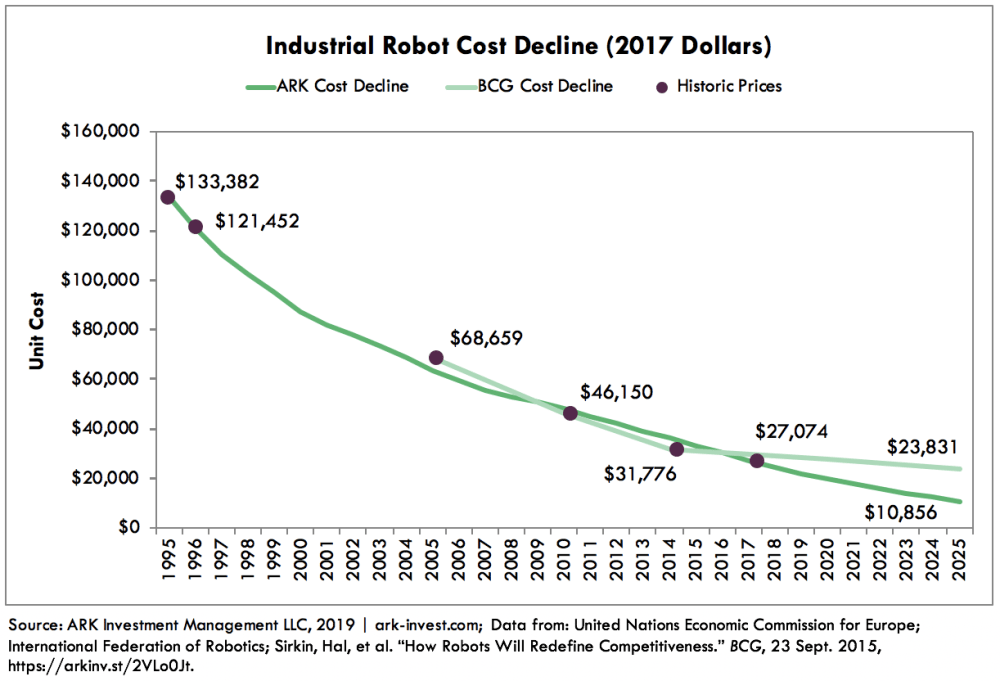
Six Trends Driving the Adoption of Industrial Robots
Increased operational efficiency is a major driver in automation and robotics growth. Robots and cobots improve productivity by operating non-stop without fatigue, which allows them to manufacture products in larger volumes. They also improve quality, as robots are designed to handle repetitive and tedious tasks without distractions or errors, which minimizes, if not eliminates, variability between batches. Additionally, robots can perform tasks in harsh environments where there could be a risk for accidents and operator injuries, thus improving workplace safety.
Labor shortages have led to an increased focus on automated manufacturing processes, as there is often insufficient staff to meet the demands of high-volume operations. Robotics can help eliminate labor shortages by working in conjunction with operators or by working in harsh environments. The collaboration between human and machines offers opportunities for employees to transition from manual repetitive work into more specialized roles that support the implementation and maintenance of smart manufacturing technologies.
A global pandemic made manufacturing companies face numerous challenges, including isolation restrictions in the workplace, supply chain disruptions, and labor shortages. During that time, a focus on operational resilience accelerated the adoption of robotics technologies that support remote management and guidance.
Digital technologies integrated into manufacturing processes, also known as Industry 4.0, add a high level of agility and connectivity to industrial machines with enhanced speeds, increased flexibility, and higher-quality outputs. Recent breakthroughs in machine learning (ML) coupled with the burgeoning availability of artificial intelligence (AI) solutions enable an even higher level of integration that leverages the use of big data, the IIoT, and digital twin technology to further enhance robotics utilization throughout a machine’s lifecycle. And while Industry 4.0 focuses on the interconnection of devices through the design of data-driven production lines, processes, and machines, Industry 5.0 looks beyond machine-to-machine (M2M) interactions, aiming to enhance the collaboration between human and robots within hybrid environments where open system architectures and IT/OT convergence are key to optimizing productivity, safety, and sustainability.
Availability is also driving interest in robotics systems, as robots and cobots are becoming much more affordable and easier to use. The combination of these technologies within a manufacturing platform enables automated manufacturing processes that are easy to program and accessible via known user interfaces, which simplifies the interaction between human and robots and allows for new levels of efficiency.
Interoperability through centralized architectures and open platforms makes it easier for automation systems, machines, and robots to work together. Advancements in computer power, open-source software, and novel networking technologies allow for faster commissioning, assembly, installation, and maintenance.
The Benefits of Robots and Cobots in Smart Manufacturing
The use of robotics in industrial applications can lead to increased sustainability in manufacturing by helping end-users meet their economic, social, and environmental goals. Manufacturers can increase process efficiency with faster cycle times, higher yields, and lower costs by modernizing manual labor and small throughput tasks with robotics solutions. Robots and cobots can also leverage system and factory data output to further optimize efficiency and reduce downtime across integrated operations. With consideration for human factors, robotics end-users can introduce solutions designed to perform physically demanding and repetitive tasks, allowing the human workforce to devote more time to tasks that yield higher business value.
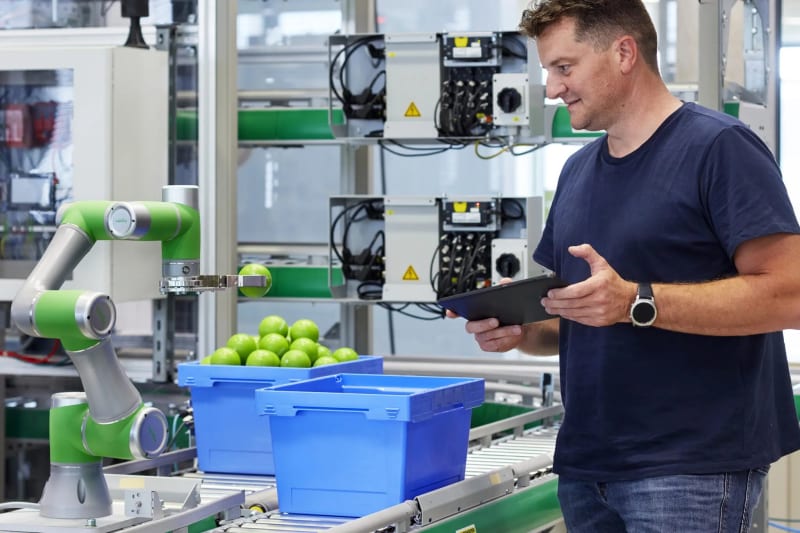
Industrial robotics solutions can offer a sustainable approach to increased production. Cobots can be designed to improve factory sustainability by reducing raw material waste and energy use throughout their lifecycle, and the increased efficiency of robotics solutions can lead to smarter overall operations that optimize industrial production while preserving the planet.
Ideal Applications for Collaborative Robots
Industrial robots are indispensable for a wide variety of manufacturing processes in a wide range of industrial markets, and especially in operations that require high-volume outputs executed with precision and speed. Robots and cobots used for
- Packaging tasks, such as loading, unlading, pelletizing, and depalletizing, help achieve the demand for sustainable and recyclable packaging.
- Machine assembly quickly and accurately convert small parts into larger units, improving overall flexibility, throughput, and quality while reducing floor space.
- Material working improve the precision, efficiency, and safety of applications ranging from simple bend and press tasks to multi-axis CNC machines.
- Conveying equipment and machinery, such as cartesian and delta picker solutions, are capable of selecting and packaging products and moving items from one piece of equipment to another, enabling complete material handling and packaging solutions that go well beyond logic, motion, and control.
Food and beverage manufacturing make it easier to adhere tostringent safety and hygiene requirements.

- Life Sciences help meet the increased demand for new drugs by increasing the efficiency and throughput and reducing the costs for various laboratory and production processes.
- Semiconductor manufacturing meet the demand for high-precision assembly by providing unparalleled flexibility, reliability, and consistency.
- Automotive production support painting, welding, and assembly processes and help manufacturers contend with an increase in production complexity and persistent labor shortages while creating a safer, more productive work environments.
- EV Battery cell production and recycling increase capacity in real-time and boost productivity, which is especially beneficial as the electric vehicle (EV) market continues to expand.
- Logistics and warehousing help accelerate the pace of product deliveries around the world, which is especially beneficial as eCommerce continues to accelerate the pace of product delivery.
Optimizing Production with the Right Cobot Solution
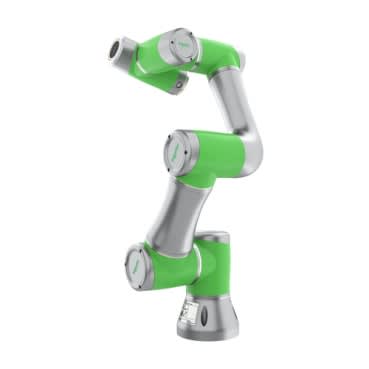
When coupled with digitization and advanced automation, cobots can help mitigate production and sustainability challenges within manufacturing processes. The Lexium product portfolio from Schneider Electric goes beyond robotics to provide fully integrated systems from concept to operation.
Lexium cobots are designed to work alongside humans and as part of fully integrated robotics systems that improve efficiency and productivity while reducing downtime. Benefits include:
- Performance: They reliably perform monotonous, tedious, repetitive, and physically challenging tasks and support high position accuracy and accurate joint servo control.
- Ruggedness: They robustly withstand the hazards of a number of challenging environments.
- Safety features, such as collision protection, visual system protection, and precise force control allow, which ensure safe collaboration with humans.
- Easy setup, whichis achieved through plug-and-play functionality, free-drive and graphic programming, and teach-in mode capabilities.
- Form Factor: Lexium cobots are light and compact, ranging from 3kg to 18kg,
- Easy Integration via open software and hardware platforms, External Short Messaging Entity (ESME) function blocks, and vision system and digital twin functionalities.
- Connectivity: Lexium cobotscan connect wirelessly using a tablet and support iOS, Android, and Windows platforms, along with a wide range of fieldbuses.
- Broad Application Suitability: Lexium cobots are designed to work alongside humans in a wide range of applications, including quality testing, machine tending, gluing, welding, painting, and polishing.
The Lexium Cobot Ecosystem
Lexium Collaborative Robots from Schneider Electric can be integrated with high performance multi-axis machines and dynamic servo drives technology to enable high-speed motion and precise positioning. This can be achieved using the company’s Modicon motion controllers, which integrate PLC, motion, and robotics control functionalities on a single hardware platform and are built using open automation standards and protocols that enable flexibility, scalability, and ease of integration with third-party equipment. Once the cobots and controllers are selected and paired with Lexium servo motors and drives, advanced operator interfaces, and other electrical components, users can combine them into a suite of connected products using Schneider Electric’s EcoStruxure Machine Expert software, an open, IoT-enabled, and interoperable platform designed to enable the flow of collaborative data between smart products, robots, controls, software, and services. Users can also leverage Schneider Electric’s EcoStruxure Machine Expert Twin, a digital twin solution that allows users to create digital models of real machines and use those to optimize their mechanical and electrical controls. This virtual commissioning can reduce time-to-market by up to 50% and decrease commissioning time by up to 60%. In addition, machine builders and system integrators who use Schneider Electric open architectures to embrace IT/OT convergence can reduce deployment time while minimizing project risk.
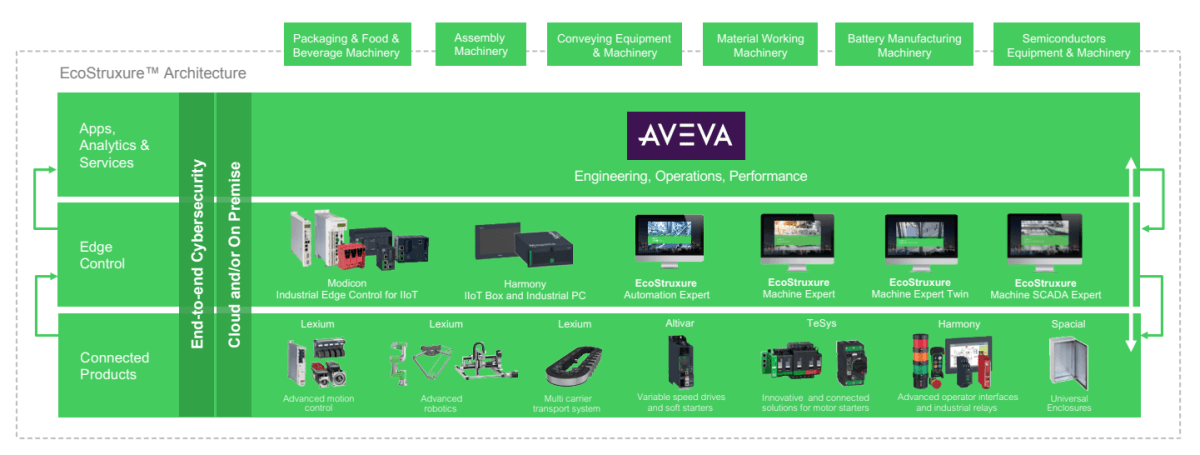
Implementing End-to-End Integrated Cobot Solutions with Schneider Electric and RS
With the right partnership, machine builders and automation integrators can implement reliable end-to-end cobot solutions with minimized risk and reduced deployment time.
Schneider Electric’s Lexium portfolio, available at RS, combines mechanical, electrical, PLC logic, and software services to offer end-to-end integrated smart solutions for automation, robotics, safety, and data acquisition. It also leverages the knowledge and experience that the company has gained as a result of having upgraded its own manufacturing facilities with robots and digital solutions to better serve end-users.
RS can support partnerships with machine builders and automation integrators through its wide product offering, expertise, and local support. RS can also help you identify, implement, and maintain the right cobot, motion servo drive, controller, software, and electro-mechanical components from concept to commissioning and beyond. To get started with end-to-end integrated collaborative robot or cobot solutions for your production facility, please contact your local RS representative at 1.866.433.5722 or reach out to the RS technical support team.
